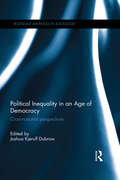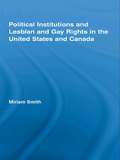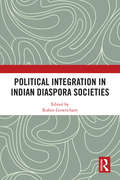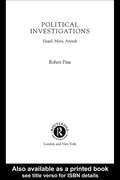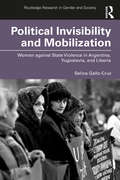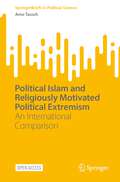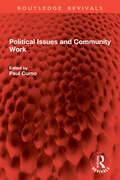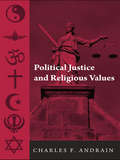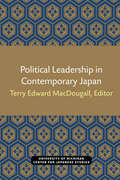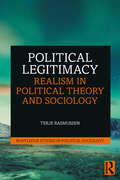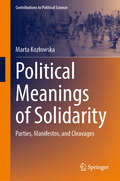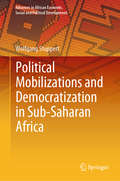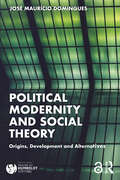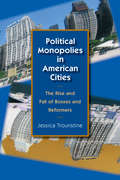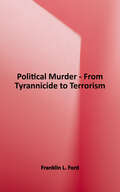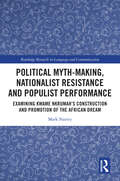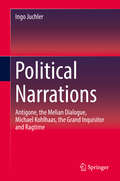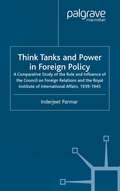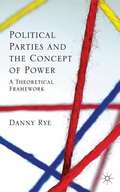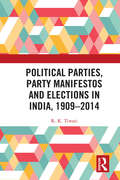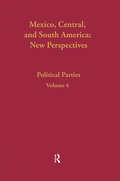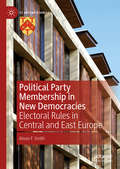- Table View
- List View
Political Inequality in an Age of Democracy: Cross-national Perspectives (Routledge Advances in Sociology)
by Joshua Kjerulf DubrowThe world has witnessed the creation of new democracies and the maturing of old ones. Yet, everywhere there is democracy, there is also political inequality. Voices of everyday folk struggle to be heard; often, they keep silent. Governments respond mostly to the influential and the already privileged. Our age of democracy, then, is the old age of inequality. This book builds on U.S. scholarship on the topic of political inequality to understand its forms, causes and consequences around the world. Comprised of nine theoretical, methodological and empirical chapters, this path-creating edited collection contains original works by both established and young, up-and-coming social scientists, including those from Latin America, Eastern Europe, Greece and the U.S. Political Inequality in an Age of Democracy addresses the present and future of the concept of political inequality from multi-disciplinary and cross-national perspectives.
Political Institutions and Lesbian and Gay Rights in the United States and Canada (Routledge Studies in North American Politics)
by Miriam SmithLesbian and gay citizens today enjoy a much broader array of rights and obligations and a greater ability to live their lives openly in both the U.S. and Canada. However, while human rights protections have been exponentially expanded in Canada over the last twenty years, even basic protections in areas such as employment discrimination are still unavailable to many in the United States. This book examines why these similar societies have produced such divergent policy outcomes, focusing on how differences between the political institutions of the U.S. and Canada have shaped the terrain of social movement and counter-movement mobilization. It analyzes cross-national variance in public policies toward lesbians and gay men, especially in the areas of the decriminalization of sodomy, the passage of anti-discrimination laws, and the enactment of measures to recognize same-sex relationships. For political science, sociology, and queer studies alike, this book will prove vital as movements for lesbian and gay rights continue to recast the social landscape in North America and beyond.
Political Institutions and Party-Directed Corruption in South America
by Daniel W. GingerichAn important question for the health and longevity of democratic governance is how institutions may be fashioned to prevent electoral victors from drawing on the resources of the state to perpetuate themselves in power. This book addresses the issue by examining how the structure of electoral institutions - the rules of democratic contestation that determine the manner in which citizens choose their representatives - affects political corruption, defined as the abuse of state power or resources for campaign finance or party-building purposes. To this end, the book develops a novel theoretical framework that examines electoral institutions as a potential vehicle for political parties to exploit the state as a source of political finance. Hypotheses derived from this framework are assessed using an unprecedented public employees' survey conducted by the author in Bolivia, Brazil and Chile.
Political Integration in Indian Diaspora Societies
by Ruben GowricharnThis book studies the political integration of Indian diaspora communities into their host societies. It argues that insertion occurs on an ethnic basis which enables these groups to utilise their clout, and at the same time exert collective rights in matters like freedom of religion, organisation and lifestyle. Drawing on case studies from South Africa, America, and the Caribbean, the volume analyses different forms, levels and patterns of groupist political integration. It examines various instances of integration such as anti-Indian apartheid laws; the life and times of Dr Sudhindra Bose, one of the early Bengali intellectuals in the US; Hindutva organisations in the US/UK; as well as the introduction of the Overseas Citizen of India (OCI) Scheme by the Indian government. An important intervention in the study of ethnic groups and their integration, the book will be of interest to students and researchers of diaspora studies, globalization and transnational migration, cultural studies, minority studies, sociology, political studies, international relations, and South Asian studies.
Political Investigations: Hegel, Marx and Arendt
by Robert FineIn this highly innovative book Robert Fine compares three great studies of modern political life: Hegel's Elements of the Philosophy of Right, Marx's Capital and Hannah Arendt's Origins of Totalitarianism, and argues that they are all profoundly radical texts, which jointly contribute to our understanding of the modern world. Fine maintains that these works are far more revealing when read together than in opposition, and draws a direct parallel between Hegel’s critique of social forms of right and Marx’s critique of social forms of value. Fine shows how fruitfully their work can and should be combined. Hannah Arendt was in turn critical of what she saw as the historicism of both Hegel and Marx, but Fine argues that her study of the origins of totalitarianism directly picks up on their insights into the modern potential for fanaticism and destructiveness. Arendt never disavowed any of the nineteenth century thinkers who prefigured the catastrophes to come, but Fine shows her indebtedness to Hegel and Marx. This fascinating book offers a re-reading of these texts as three pivotal moments in the construction of a critical humanist tradition.
Political Invisibility and Mobilization: Women against State Violence in Argentina, Yugoslavia, and Liberia (Routledge Research in Gender and Society)
by Selina Gallo-CruzPolitical Invisibility and Mobilization explores the unseen opportunities available to those considered irrelevant and disregarded during periods of violent repression. In a comparative study of three women’s peace movements, in Argentina, the former Yugoslavia, and Liberia, the concept of political invisibility is developed to identify the unexpected beneficial effects of marginalization in the face of regime violence and civil war. Each chapter details the unique ways these movements avoided being targeted as threats to regime power and how they utilized free spaces to mobilize for peace. Their organizing efforts among international networks are described as a form of field-shifting that gained them the authority to expand their work at home to bring an end to war and rebuild society. The robust conceptual framework developed herein offers new ways to analyze the variations and nuances of how social status interacts with opportunities for effective activism. This book presents a sophisticated theory of political invisibility with historical detail from three remarkable stories of courage in the face of atrocity. With relevance for political sociology, social movement studies, women’s studies, and peace and conflict studies, it contributes to scholarly understanding of mobilization in repressive states while also offering strategic insight to movement practitioners.
Political Islam and Religiously Motivated Political Extremism: An International Comparison (SpringerBriefs in Political Science)
by Arno TauschThis open access book presents an international comparison of religiously motivated extremism in the Arab world and around the globe. Based on data from the Arab Barometer and the World Values Survey, it applies advanced statistical techniques to analyze how religiously motivated political extremism affects political and social outcomes as well as political violence. The study clearly shows that identification with a political Islam that also influences elections, promotes religious and gender discrimination, and advocates an Islamist interpretation of Islam, are the main interrelated syndromes of political Islam that together explain more than 50% of the total variance of the 24 model variables used.“A carefully and methodically flawlessly researched work, which is highly recommended for all those who deal seriously with this topic. Professor Arno Tausch is clear-headed and possesses a remarkable ability to make the broad picture of Political Islam accessible.“Hon. Prof. Gunther Hauser, Head of the Department Strategy and Security Policy, National Defense Academy, Vienna, Austria“Methodological rigorous, scientifically sound, empirically rich and combining the best of qualitative and quantitative approaches, Prof Arno Tausch has produced a tour de force on Political Islam. This study reflects the best scholarship on the subject and will be of use to both policy makers and academics.”Prof Hussein Solomon, Academic Head of the Department of Political Studies and Governance, University of the Free State, South Africa
Political Issues and Community Work (Routledge Revivals)
by Paul CurnoOriginally published in 1978 this book was compiled with practitioners in mind. It clarifies the implications of significant political theories and issues of the 20th Century which affected their work. Drawing on case studies from their own experience, the contributors underline the political variables facing the community worker, whatever the context. Examples are from the local neighbourhood, from inside and outside the local authority, and – dramatically illustrating the ideological, practical and political dilemmas faced in some form by most community groups – from a picture of community action in Northern Ireland. The final section considers two growing strands in community work – the importance attached to developing knowledge and technical competence, and the increasing emphasis being given to making alliances with other relevant groups and organisations.
Political Justice and Religious Values (Sociology Re-Wired)
by Charles AndrainWhy do individuals and groups hold distinctive theological views? Why do these beliefs change? In what ways do theological interpretations influence concepts of spiritual and political justice? How and why do these concepts of justice affect policy preferences held by religious liberals and conservatives? Much has recently been written about the relationship between power, conservative politics, and evangelical religious groups, but very little attention has been paid to so-called "progressive" religious groups among Protestants, Catholics, and Jews and their relationship to political thought and action. This wide-ranging and interdisciplinary work, ideal for use in college courses on religion and social issues, explores the impact of theological interpretations about God, the individual, society, church, and government on attitudes toward procedural and distributive justice. Major issues revolve around civil liberties, sexual choice, gender equality, world peace, prison reform, and income distribution
Political Leadership in Contemporary Japan (Michigan Papers in Japanese Studies #1)
by Terry Edward MacDougallPolitical Leadership in Contemporary Japan
Political Legitimacy: Realism in Political Theory and Sociology (Routledge Studies in Political Sociology)
by Terje RasmussenPolitical Legitimacy: Realism in Political Theory and Sociology explores the concept of political legitimacy, the nature of the normative foundation of politics and the state. With particular attention to the broad theoretical approach of political realism within political theory and political sociology, it examines the work of figures including Bernard Williams, Raymond Geuss, John Grey, Max Weber, and Niklas Luhmann, among others. Contending that in the face of the waning influence of political idealism, the insights of political realism constitute a promising way forward, the author also advances the view that realist political theory would benefit from sociological insights, particularly on the nature of the state. As such, Political Legitimacy will appeal to scholars and students of social and political theory, political sociology, and political philosophy.
Political Meanings of Solidarity: Parties, Manifestos, and Cleavages (Contributions to Political Science)
by Marta KozłowskaThis monograph discusses the concept of solidarity. Using Germany as a case study, the book investigates how political actors – political parties in specific – use the term solidarity in their programmatic documents. It maps out the attitudes, features, and behaviors that the parties continuously denote as expressions of solidarity and reconstructs the generalized concept of solidarity held by each party. It categorizes earlier ideas of solidarity into micro and macro perspectives and uses both theoretical and empirical considerations to build a model of solidarity and identify the elements that make solidarity what it is.Departing from the typical procedure in intellectual history research, this volume takes inspiration from Wittgenstein, starting with the language and tracing it back to its historical setting. Thus, it avoids the trap of speaking of only one meaning of solidarity and allows for more attuned analysis of the differences in understanding the concept. Furthermore, it links the scientific study of the concept of solidarity with research on political competition, and – in broader sense – political theory and party politics research. Closing the gap in scientific coverage of the concept of solidarity, this book will be of interest to students and researchers studying political theory, political sociology, political philosophy, political history, and political parties.
Political Mobilizations and Democratization in Sub-Saharan Africa (Advances in African Economic, Social and Political Development)
by Wolfgang StuppertThis book explores why democratization processes in Sub-Saharan Africa have made so little progress despite more than two decades of multi-party politics on the subcontinent. By applying multiple linear regression analyses to a new data set on multi-party elections in Sub-Saharan Africa, the study investigates the relationship between political mobilizations and electoral competitiveness. It finds that the more societal groups engage in political mobilizations, such as protests and strikes, the more competitive elections become. Based on these results, the author argues for a change in the policies of international democracy assistance programs. The study’s findings suggest that efforts to promote democracy would likely be more successful if international donors focused their support on organizations that have active constituencies and are willing to use their mobilization capacity to address ruling elites with political or socio-economic grievances.
Political Modernity and Social Theory: Origins, Development and Alternatives
by Jose Maur¡cio DominguesModern liberal democracy and authoritarian collectivism have known diverse political regimes; autocratic, oligarchic or democratic, they each consist of a mixed, partly oligarchic regime in which plebeian politics are subordinated. With authoritarian collectivism’s defeat, a return to modernity has produced one more hybrid configuration.An in-depth investigation of political modernity and how it is differentiated from other forms of society, this book researches its origins and trajectory as a specific dimension of modern civilisation – articulating a renewed critical theory through an analysis of rights and law, politics, state and autonomy, social reproduction, crisis and political change.Examining these diverse aspects, Political Modernity and Social Theory proposes an encompassing and far-reaching approach spanning past and present – stressing radical plebeian democracy and maintaining a strong opening to the future and to possible alternatives to modernity.The Open Access version of this book, available at www.taylorfrancis.com, has been made available under a Creative Commons Attribution (CC-BY) 4.0 license.
Political Monopolies in American Cities: The Rise and Fall of Bosses and Reformers
by Jessica TrounstineAround the same time that Richard J. Daley governed Chicago, greasing the wheels of his notorious political machine during a tenure that lasted from 1955 to his death in 1976, Anthony “Dutch” Hamann’s “reform” government centralized authority to similar effect in San Jose. In light of their equally exclusive governing arrangements—a similarity that seems to defy their reputations—Jessica Trounstine asks whether so-called bosses and reformers are more alike than we might have realized. Situating her in-depth studies of Chicago and San Jose in the broad context of data drawn from more than 240 cities over the course of a century, she finds that the answer—a resounding yes—illuminates the nature of political power. Both political machines and reform governments, she reveals, bias the system in favor of incumbents, effectively establishing monopolies that free governing coalitions from dependence on the support of their broader communities. Ironically, Trounstine goes on to show, the resulting loss of democratic responsiveness eventually mobilizes residents to vote monopolistic regimes out of office. Envisioning an alternative future for American cities, Trounstine concludes by suggesting solutions designed to free urban politics from this damaging cycle.
Political Monopolies in American Cities: The Rise and Fall of Bosses and Reformers
by Jessica TrounstineAround the same time that Richard J. Daley governed Chicago, greasing the wheels of his notorious political machine during a tenure that lasted from 1955 to his death in 1976, Anthony “Dutch” Hamann’s “reform” government centralized authority to similar effect in San Jose. In light of their equally exclusive governing arrangements—a similarity that seems to defy their reputations—Jessica Trounstine asks whether so-called bosses and reformers are more alike than we might have realized. Situating her in-depth studies of Chicago and San Jose in the broad context of data drawn from more than 240 cities over the course of a century, she finds that the answer—a resounding yes—illuminates the nature of political power. Both political machines and reform governments, she reveals, bias the system in favor of incumbents, effectively establishing monopolies that free governing coalitions from dependence on the support of their broader communities. Ironically, Trounstine goes on to show, the resulting loss of democratic responsiveness eventually mobilizes residents to vote monopolistic regimes out of office. Envisioning an alternative future for American cities, Trounstine concludes by suggesting solutions designed to free urban politics from this damaging cycle.
Political Murder: From Tyrannicide to Terrorism
by Franklin L. FordThe author's unprecedented inquiry into assassination traverses civilizations, cultures, religions, and modes of social behavior to locate the common threads of this often mysterious and always shocking phenomenon. Are there similarities between the killings of the Gracchi brothers and the Kennedy brothers? Does the Baader-Meinhof terrorist gang have roots in the rightist murder teams of Weimar Germany? Was political context as important to the crucifixion of Jesus as to the death of Martin Luther King in 1968? Are political murders usually produced by elaborate conspiracies, or are they more often the work of lone assassins? What circumstances and impulses motivate an individual to risk his or her own life to kill another for reasons of state? This fast-paced narrative, interspersed with reflections, finds intriguing implications in a multitude of famous cases. From the first known case of political murder, Ehud the Benjamite's stabbing of Eglon, to the recent gunning down of Indira Gandhi by two trusted Sikh bodyguards, the frequency of such acts has varied greatly over time. Mainland Greece suffered few political murders in the violent century of Pericles. The Romans, despite their bloody record under the Empire, avoided assassination for almost four hundred years under the Republic. There was a third such "remission" during the twelfth and thirteenth centuries, Europe's high Middle Ages, matched by yet another extending from 1650 to 1789. In the interval between, the sixteenth century was an especially violent time in countries such as Scotland, the Netherlands, and France. Assassination and terrorism increased again after 1815, but the nineteenth century did not come close to equaling the twentieth in the number of brutal episodes. Ford's exploration of calculated, personalized assassination draws on history, literature, law, philosophy, sociology, and religion. Addressing the vast array of cases and combing thousands of years of history, he asks most of all whether assassination works. Does it, in even a minority of cases, produce results consistent with the aims of those who attempt it? Can it forestall evil acts or prevent irreparable damage inflicted by misguided leaders? Or is it "bad politics" in every sense of the term? The questions are numerous, and this book offers a sophisticated basis for seeking answers.
Political Myth-making, Nationalist Resistance and Populist Performance: Examining Kwame Nkrumah's Construction and Promotion of the African Dream (Routledge Research in Language and Communication)
by Mark NarteyUsing the socio-political discourse of Kwame Nkrumah, a pioneering Pan-Africanist and Ghana’s independence leader, Nartey investigates the notion of political myth-making in a context underexplored in the literature. He examines Nkrumah’s construction of a myth described in the book as the Unite or Perish myth (i.e. the idea of a ‘United States of Africa’ being a prerequisite for the survival of Africa in the post-independence period), exploring the rhetorical resources he deployed, categorizing and analyzing key tropes and metaphors, and setting out the myth’s basic components. This book focuses on three areas: an investigation of political myth-making as a social and discursive practice in order to identify particular semiotic practices and linguistic patterns deployed in the construction of mythic discourse, the unpacking of the discursive manifestation, representation, features and functions of political mythic themes, and finally to propose and implement an integrated discourse analytical framework to account for the complexities of mythic discourse and political narratives in general. It analyzes how Nkrumah deployed his discourse to concurrently construct heroes and villains, protagonists and antagonists as part of an ideological mechanism aimed at galvanizing support for and instigating action on the part of the masses towards his lifelong African dream. Nartey’s book steps out from the conventional domain of critical discourse studies to focus on myth as a form of populist performance. It will be of interest to postgraduate students and academics in (critical) discourse studies, rhetorical discourse analysis, African and Diaspora studies, and African history as well as non-academics such as journalists, political commentators, and people who consider themselves to be Nkrumaists and Pan-Africanists.
Political Narrations: Antigone, The Melian Dialogue, Michael Kohlhaas, The Grand Inquisitor And Ragtime
by Ingo JuchlerThis book analyzes narrations embedded in political disputes, allowing readers to gain a deeper understanding of modern political reality. The author explores this theme in readings of the Sophocles tragedy Antigone, the Melian Dialogue of Thucydides, Heinrich von Kleist’s novella Michael Kohlhaas, Fyodor Dostoevsky's The Grand Inquisitor and E.L. Doctorow’s Ragtime novel, taking into account the relevant interdisciplinary aspects of the narratives. His study of these four narrations focuses on key political concepts, such as might and right, self-interest, legality and justice, the nation-state and democracy, and relates them compellingly to current actuality. Since narrations can exert comprehensive and lasting influence on individuals’ political discernment, this systematic analysis allows for a better comprehension of politics in education and civics.
Political Order and Inequality
by Carles BoixThe fundamental question of political theory, one that precedes all other questions about the nature of political life, is why there is a state at all. Is human cooperation feasible without a political authority enforcing it? Or do we need a state to live together? This problem then opens up two further questions. If a state is necessary to establish order, how does it come into place? And, when it does, what are the consequences for the political status and economic welfare of its citizens? Combining ethnographical material, historical cases, and statistical analysis, this book describes the foundations of stateless societies, why and how states emerge, and the basis of political obligation. As a result of this inquiry, it explains the economic and political roots of inequality, describes the causes of the stagnation of the preindustrial world, and explores what led to the West's prosperity of the past two centuries.
Political Parties and Public Policy in the German L�nder: A Comparative Study Of The Role And Influence Of The Council On Foreign Relations And The Royal Institute Of International Affairs, 1939-1945
by Ed TurnerWhat is the role of elites in shaping foreign policy? Did unaccountable foreign policy elites shape the post-1945 world order? Chatham House and the Council on Foreign Relations were vital in America's shift from isolationism to globalism, and in Britain's shift from Empire to its current pro-American orientation and were also fundamental in engineering public backing for a new world order. Inderjeet Parmar presents new evidence to show how well-organized and well-connected elite think tanks helped to change the world.
Political Parties and the Concept of Power
by Danny RyeThis richly critical and original perspective on the way power within political parties structures and influences party life offers an original investigation into the nature of the forces that make members and representatives both loyal and beneficial to a contemporary political party. The study skilfully and imaginatively weaves together theoretical reflection through the use of interviews and archive material to provide a unique perspective on power, arguing that it is both more complex and nuanced than mainstream approaches to political parties assume. As well as providing a more satisfactory, general, framework for understanding how power functions in democratic politics, this book also delivers a fresh interpretation of the development of the modern Labour Party. This text is essential reading for students and scholars of British Party politics and may be of interest to academics exploring political parties more generally.
Political Parties, Party Manifestos and Elections in India, 1909–2014
by R. K. TiwariIn the parliamentary system of government, manifestos constitute and represent an important aspect of the democratic electoral politics as statements of a party’s ideology, response and policy. This book offers an examination of election manifestos of different political parties in India at the national level. It explores the manifesto as an input to the policy process and presents a comparative perspective and understanding on the issues and approaches of the national political parties on key affairs. The book traces the evolution of the electoral system, political parties and party manifestos in India as they emerged and developed over time. It looks at the Statutes of 1909, 1919 and 1935 along with the party manifestos and elections until 1945–46. The author further analyses Constituent Assembly debates on the electoral system and the stances of political parties on national reconstruction through documents from parties, including the Indian National Congress, the Communist Party of India, the Socialist Party, Jana Sangh and the All India Scheduled Castes Federation. Covering manifestos of sixteen Lok Sabha Elections (from the first general election of 1952 to 2014), this book provides a comprehensive overview of how major political parties think on significant social, economic, political, foreign and defence-related issues. It will be useful to scholars and researchers of political science, election studies, modern Indian history, public administration, law and governance, sociology, media and journalism as also to legislators and policymakers.
Political Parties: Mexico, Central, and South America
by Jorge I. DomínguezWith the fall of the Soviet Union and the acceleration of global economic, political, and social pressures, Mexico, Central, and South America have undergone vast transformations. This collection details these changes and updates the scholarship on a region once defined by the cold war and now struggling to define itself within the era of economic globalization and democratization. Rapid changes in the area have produced new and contentious scholarship, the best of which is contained in this new five-volume set. Collected by one of the premiere authorities on the region, each volume contains a valuable introduction and considers a key discipline of study. Together the volumes provide a comprehensive view, which will prove an indispensable research tool for students and scholars alike.
Political Party Membership in New Democracies: Electoral Rules in Central and East Europe (St Antony's Series)
by Alison F. SmithThis book explores the impact of electoral rules on political party development in Central and East Europe. It finds that ‘high district magnitude’ proportional electoral systems encourage centralised organisational development and campaigning – where communication with voters is conducted primarily via mass, social and digital media – while small electoral districts stimulate grassroots campaigning. As a result, low magnitude electoral systems are more likely to create an active role for party members, stimulating membership recruitment. The book further examines how parties organise and campaign on the ground. The analysis of in-depth surveys and interviews with party elites in Estonia, Lithuania and Slovakia sheds light on areas of party life that are rarely examined, including party fundraising. Overall, the effects of electoral systems on party organisation and campaigning reflect patterns previously observed in Western Europe, demonstrating that a degree of convergence has occurred.
